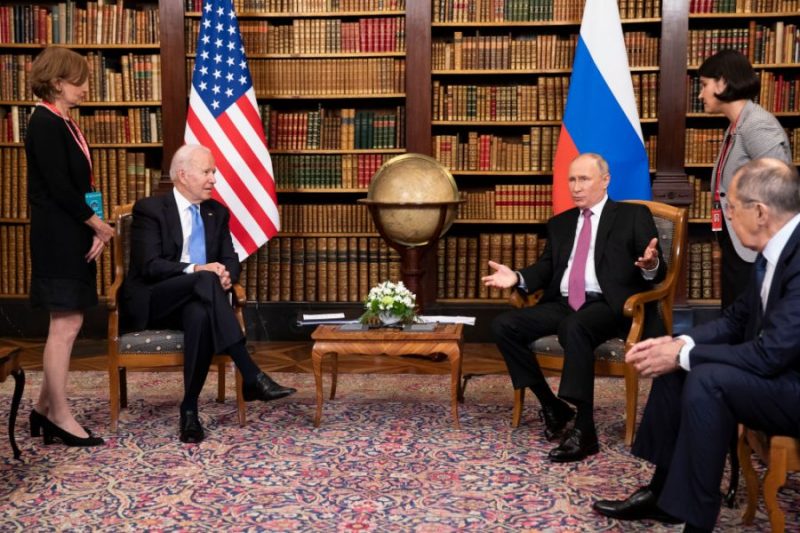Why is Russia worried about the Quad?
Posted By Ian Hill on July 1, 2021 @ 06:00

With the spotlight recently on Russia’s relations with the US and Europe, following the meeting between presidents Joe Biden and Vladimir Putin and the G7 and NATO summits, less attention has been paid to the complex challenges facing Russia in Asia.
Hard on the heels of the inaugural Quad summit between the leaders of Japan, Australia, India and the US in mid-March, Russian Foreign Minister Sergey Lavrov visited China, South Korea, India and Pakistan to underscore Russia’s continuing relevance.
Lavrov’s talks in New Delhi aimed to bolster Russia–India ties. He underlined Moscow’s concerns about the Quad, repeating Russia’s opposition to the creation of security blocs in the Asian region. In December, Lavrov had sharply criticised [1] the Quad as part of a US-led ‘persistent, aggressive and devious’ policy intended to ensnare India in its ‘anti-China games’ and designed to undermine the close partnership between Moscow and New Delhi. Russia also claims the Quad is divisive and undercuts ASEAN centrality.
Why is Russia so unhappy about the Quad? Because it sees it as a potential gamechanger, disrupting Russia’s position and strategy in Asia.
Russia’s so-called pivot to Asia over the past decade reflects political and economic drivers, both given impetus since 2014 by Moscow’s post-Crimea estrangement from Europe and America.
First and foremost among Russia’s priorities in Asia is China. The close and growing strategic partnership between Moscow and Beijing reflects political affinities, economic complementarities and foreign policy convergences.
But it remains a pragmatic, transactional relationship, and Moscow is conscious that growing asymmetries make it the junior partner.
Concerned to retain autonomy, Russia has sought to balance its close ties with China by expanding relations with other Asian states, especially India but also Japan and ASEAN states. Little headway has been made with Japan, with the intractable Kuril Islands dispute impeding progress. Efforts to intensify economic links, especially energy and arms sales, with partners like Vietnam and Indonesia have made more headway, albeit off a low base.
Russia engages in Asian regional institutions, notably ASEAN, APEC and the East Asia Summit, to underscore its regional credentials, complementing its stepped-up bilateral activity.
Underpinning its Asian swivel, Russia has promoted its Greater Eurasian Partnership idea as a platform for engagement with the wider Asian region, based on institutions such as the Eurasian Economic Union and the Shanghai Cooperation Organisation—in which Russia plays a leading role. Moscow has advocated greater cooperation between the EEU and ASEAN, and supports observer status for the EEU at APEC. Russia has sought to leverage its geographical location to promote its relevance to greater connectivity between Asia and Europe.
Moscow fears, though, that the emerging Indo-Pacific strategic concept, especially closer security cooperation within the Quad, jeopardises its position in Asia.
Conceptually, the Indo-Pacific construct is a maritime-based cooperative framework, as opposed to the continental Eurasian-centred vision for regional integration promoted by Russia. Whereas the Eurasian cooperative model would confer a leading role on Russia, it’s not clear to Moscow how it might fit into the Indo-Pacific framework.
In practical terms, Moscow worries that the Quad, perceived as a US-orchestrated security coalition against China, will complicate Russia’s efforts to strike some balance in its relationships with China and other key Asian regional countries, especially India.
If the Quad gains momentum, drawing in Asia–Pacific players such as South Korea and ASEAN, Russia fears that it will become more isolated and be compelled into greater dependence on China than it would like.
India is a particular concern. Moscow knows that New Delhi’s growing anxieties about Beijing, including military rivalry, underpin India’s involvement in the Quad. Moscow worries this will encourage New Delhi’s tilt towards closer cooperation with the US, weakening Russia’s own ‘special and privileged partnership’ with India.
India has tried to mollify Russia, talking up the Indo-Pacific as a principles-based, inclusive and unifying construct and encouraging Moscow to view it positively as an opportunity—but to no avail.
Moscow remains suspicious of where India is heading. And, realistically, while Russia is an important partner for India, especially in energy and defence, the overall relationship remains thin, compared to India’s growing and diverse connections with the US and others.
In this context, Lavrov’s subsequent visit to Pakistan—his first in a decade—was a clear warning to New Delhi. During talks in Islamabad, Lavrov discussed expanding Russian security assistance to the Pakistan military—a move that would alarm India.
Alive to potential marginalisation, Moscow will strive to bolster its relevance and importance as a credible major actor in the wider Asian region. Expect further intense Russian bilateral and regional diplomacy over coming months, as well as efforts to diversify ties with other Asian partners, such as Bangladesh, Pakistan and Myanmar. Moscow will try to lift its modest military presence and influence in the Indian Ocean, building on the recent naval basing agreement with Sudan and military exercises with India, Iran and Pakistan.
But with the Quad’s importance likely to grow, giving visible form to the Indo-Pacific strategic construct, the challenges facing Russia’s Asian diplomacy will not diminish.
Article printed from The Strategist: https://www.aspistrategist.org.au
URL to article: https://www.aspistrategist.org.au/why-is-russia-worried-about-the-quad/
URLs in this post:
[1] sharply criticised: https://indianexpress.com/article/india/india-object-of-anti-china-policy-of-the-west-russia-minister-says-7098782/
Click here to print.